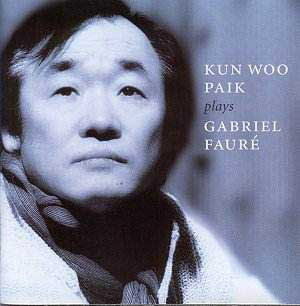Such are the similarities between the lives and music
of Fauré and Chopin that their piano works, central to both their
outputs, seem to belong together. The two lived in Paris as outsiders,
both revelling in poetic feeling and tender lyricism, and even the names
of their pieces - Nocturnes, Impromptus, Ballades - jump up and down
in their eagerness to form a club. So why has the music of Fauré
been eclipsed so completely by that of his Polish forebear? Is there
a limit to the number of preludes and nocturnes the musical public can
take to their heart? Do music lovers have only so much affection to
go round?
Hopefully not. Perhaps it is because the similarities
between the two lead people to believe that Fauré’s music is
more of the same, inevitably overshadowed by the great Chopin - one
of musical history’s few naturals of the keyboard. The similarities
are, however, superficial. For all his Italianate melodies, Chopin was
a profoundly contrapuntal composer, taking his inspiration from Bach.
Essentially nostalgic, nobody would attempt composition on these terms
again. Fauré was much more a composer of his time, interesting
for his harmonic refinement, a path that would be taken up by Debussy.
This dichotomy is illustrated by the order of tracks
on this disc. It is bookended by the two poles of Fauré’s art,
starting with the almost soppy Romance sans Paroles, Chopinesque enough
to be mistaken for something Polish, and ending with the Germanic Ballade
Op.19. Kun Woo Paik’s great virtue is that he strikes a tone that neglects
neither facet of the music, but is free of blandness or compromise.
The voicing is extremely clear, important as Fauré often places
the melody in an inner voice, giving a cool, Debussian texture, especially
apt in the stunning C sharp minor prelude, a prophetic and futuristic
work if ever there was one. In other places, especially the Ballade,
Kun Woo Paik is not afraid to use rubato, lending a suitably passionate
feeling to the piece. Technical excellence abounds throughout the disc
– the beautifully shaded dynamics of the Barcarolle or the Improvisation,
for example.
Best of all, this is a wonderfully musical disc. For
all its technical marvels, its most enjoyable aspect is the wonderfully
idiomatic music making, the thought given to each moment of even the
longer pieces, the love of this very great music. Kun Woo Paik has created
a very beautiful record that places these works in the context of their
more celebrated relations, yet demonstrates their marvellous individuality
at the same time. Highly recommended.
Aidan Twomey
![]() See
what else is on offer
See
what else is on offer 